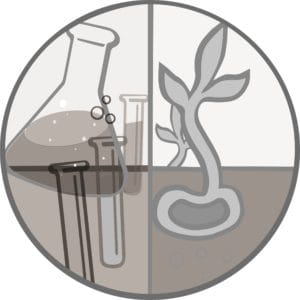Today’s Smorgasbord of Ag Chemicals Poses Special Risks to Children’s Health
By Charlotte Vallaeys
 The numbers are staggering. With 1,400 pesticides registered with the EPA—200 of them known neurotoxins and others identified as carcinogens or endocrine disruptors—is it any wonder childhood epidemics are on the rise. Indeed, 54% of American children now have a chronic health condition.
The numbers are staggering. With 1,400 pesticides registered with the EPA—200 of them known neurotoxins and others identified as carcinogens or endocrine disruptors—is it any wonder childhood epidemics are on the rise. Indeed, 54% of American children now have a chronic health condition.
Conventional foods commonly contain residues of pesticides linked to cancer, damage to the nervous system and cognitive development, or disruption of hormone functions in humans. Also, genetically modified crops are allowed in our food supply, sans labeling, introduced without adequate testing as to their potential harm on human beings or the environment. In addition, conventional processed foods often contain ingredients that were processed with synthetic solvents like hexane, which are neurotoxic.
All these human health hazards can be avoided simply by choosing organic food.
This spring Cornucopia will release a new report that explores the scientific data regarding risks associated with conventional foods, and what parents can do to reduce their children’s exposure.
Pesticides are biocides—toxic by design and engineered to kill living organisms. Yet government regulatory agencies, which should protect public health from the effects of toxic pesticides, have been widely criticized as inadequate, outdated, and susceptible to political influence, insufficiently protecting children.
The United States Department of Agriculture (USDA) annually tests common foods—both conventional and organic—for pesticide residues. Results show that conventional foods commonly contain pesticide residues, whereas organic foods are generally a safe haven.
Federal law and regulations prohibit the use of toxic synthetic pesticides in organic agriculture. As a result, studies have shown that children who eat primarily organic food have dramatically lower levels of pesticide metabolites (breakdown products) in their bodies than children eating conventional foods.
One class of insecticides commonly used in conventional agriculture—organophosphates—interferes with the enzyme acetylcholinesterase, which is needed for nerve function. Humans share the same biochemical processes as insects and other animals. This means that poisons that disrupt the neurological systems of insects also disrupt the neurological systems of “non-target species”—including humans.
The Environmental Protection Agency (EPA) states that organophosphate pesticides are “very highly acutely toxic to bees, wildlife and humans.”
While it is a well-accepted fact that organophosphates are neurological toxins, based on studies on laboratory animals, little is known about the long-term effects on public health, especially children.
What we do know is that rates of neurological disorders in children such as autism and Attention Deficit Hyperactivity Disorder (ADHD) have risen alongside the increased use of these pesticides in conventional agriculture.
And in 2010, researchers found a correlation between higher levels of specific organophosphate pesticide residues in children’s bodies and higher levels of ADHD.
Other common pesticides are classified as probable or known carcinogens. And emerging science on chemicals that disrupt the endocrine system (hormones) suggests that some pesticides, even in minute doses, may impact the reproductive health of future generations.
Agrochemical companies are not just manufacturing pesticides to be sprayed on food crops, they also have genetically engineered common food crops to internally produce the pesticides themselves. Other crops have been genetically engineered to be resistant to specific herbicides, so that weed killers that would normally kill or injure the plant can be sprayed more frequently and at higher doses.
Meanwhile, regulatory agencies, which have a congressional mandate to protect public health, have let agrochemical companies off the hook by requiring only rudimentary and outdated safety testing for pesticides.
GMO safety testing is even less stringent—it is virtually non-existent—since the government considers a genetically engineered crop to be “substantially equivalent” to a naturally bred plant.
Without adequate testing to ensure pesticides and GMOs are safe for babies, toddlers and young children, all children given conventional foods are essentially part of a huge, uncontrolled experiment.
While rates of cancer and neurological problems are rising, agrochemical companies claim that no experiment has proven that pesticide residues on foods cause human health problems. That statement is true. Although extensive testing has occurred on laboratory animals, clearly illustrating risk, testing on humans, especially testing long-term effects of pesticides on children, is non-existent as it would be highly unethical. Yet although such testing does not occur in clinical settings, it happens daily on a massive scale: our children are the agrochemical companies’ human lab rats.
Parents and caregivers are fortunate that an alternative exists. We can opt out of this experiment on our children by choosing organic foods produced without toxic pesticides. The “organic” label on foods is government-regulated and third-party certified. Organic farmers are strictly prohibited from using most synthetic inputs, including toxic pesticides or genetically engineered seed.
– Charlotte Vallaeys is Cornucopia’s Director of Food and Farm Policy and the mother of two young sons. She holds graduate degrees from Harvard and Tufts.

